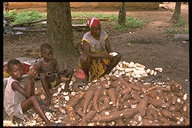|
Cassava – many uses, mostly underutilised
The cassava is an important source of dietary carbohydrates in the tropical and subtropical areas of the world, with its roots providing food for over 500 million people. It comes with hard and starchy white flesh. This vegetable is the basis in the making of cassava flour. The cassava contains a strong poison, cyanide, which needs to be eliminated during the preparation of the flour. This is done by cooking or fermenting the vegetable. Drying and grounding comes next. The cassava flour or gari is now ready for storage or use. The cassava or manioc plant has its origin in South America. Amazonian Indians used cassava instead of or in addition to rice/potato/maize. Portuguese explorers introduced cassava to Africa through their trade with the African coasts and nearby islands. Africans then further diffused cassava, and it is now found in almost all parts of tropical Africa. Africans adopted it for several reasons: It is possible to cultivate the cassava plant in shifting systems and it gives flexible harvest. Furthermore it is resistant to locust attacks and drought. Today Nigeria and Congo-Kinshasa are great producers of cassava, next to Brazil. In Southern Africa the crop is cultivated in Namibia, the Northern Province, Mpumalanga, Northern Kwa-Zulu-Natal, Mozambique, Angola, Swaziland, Malawi, Botswana and Zimbabwe. In Tanzania, Malawi, Zambia, Angola and Mozambique cassava is a very important crop and to a lesser extent in the other SADC (South African Development Community) countries.
According to Jan Viljoen, a technician in crop science at the South African institute ARC-Roodeplaat, the potential of cassava as a cash crop will increase with the continued industrialisation of Africa. In South Africa cassava is presently utilised for the production of starch (commercial and food grade starch). In the rural areas the roots and young leaves are utilised as a vegetable. The cassava produced in the rural areas is sometimes sold, but mostly the household uses it as food. Viljoen says cassava is not utilised to its full potential in South Africa. Currently the crop is in most cases only cultivated by the subsistence farmers in the rural areas because of its tolerance towards adverse conditions. Commercial farming is restricted to the Pietersburg area because of the presence of a starch-manufacturing factory. Source: Based on ARC-Roodeplaat
AfriPromote Banner Exchange
|
front page
| news
| countries
| archive
| currencies
| news alerts login
| about afrol News
| contact
| advertise
| español
©
afrol News.
Reproducing or buying afrol News' articles.
You can contact us at mail@afrol.com

